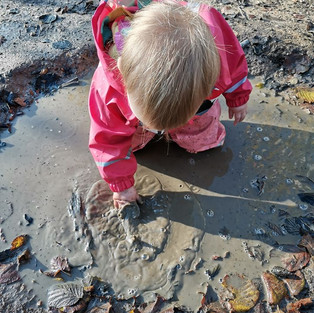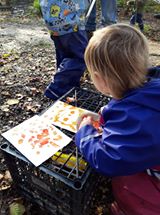How can we demonstrate the impact of Long Term Forest School to new forest school leaders?
- Lizzie
- Dec 10, 2019
- 3 min read
We love training Forest School Leaders. The training focuses on the history of Forest School, the theory that underpins the practice, how to set up and run your own Forest School, how to build skills, risk assess and of course the important aspect of how to use and teach fire and tools safely and confidently. The training course is just the start of the journey and over the next year the trainees will go off, develop a site, write risk assessments and deliver a minimum of 6 sessions which they plan and reflect on, we even visit them for one to make sure everything is on track and they feel happy. We provide ongoing online support for the training period whilst they complete their workbooks and then, after that, networking and CPD workshops and general support when needed. I know how vital it was for me when I was training to have that ongoing support from my trainer so when we set up our own training it was essential that this was part of our offering.
On the course we look at research and discuss best practice - but one thing that is so hard to put in to words and on paper, that's impossible to really see in photos and even videos, is the real impact that truly long term programmes can have on children that attend every week for most of their early childhood.
So, how can we demonstrate this to the new leaders? How can we show them the ultimate aim of the journey they are just beginning with their groups?
We show them!

A few weeks ago we invited our long term families to come and take part in a Forest School session for our Level 3 trainees to observe. We only invited those who had been attending for at least a year (although in reality they had been attending for at least 2 years, some of them as many as 5 years) to demonstrate how and why long term is so so important. As the children as so used to the safety instructions around fire we were able to demonstrate the community aspect that sharing food enhances during a Forest School session by cooking flatbreads, popcorn and marshmallows. We demonstrated how the best plans are the ones where you ditch your expectations and follow the lead of the children. We demonstrated reflection as an ongoing practice rather than something that happens just at the end of a session or group of sessions. The children demonstrated resilience, purposeful play, friendship, positive self esteem and confidence.
After the session we asked the trainees to feedback what they enjoyed and what surprised them. It was clear that their focus was on what the children did, not what the Forest School Leader did. That's exactly how it should be. They were amazed by how some children as young as 18 months were able to play with purpose, fall over, get up again, and repeat. How children as old as 13 were integrated in the play of younger children and their ability take over the fire management with just supervision from an assistant. Age was not a boundary, the grown ups played too. They were also surprised by the lack of reliance on tools, often in training it feels like there is a focus on tools but the reality is that they are there when the children want them and confidence with tool use builds up over months not weeks. When they know how to use them they ask when they need them, it isn't the focus of a session.
The trainees were learning how to write observations of the children using the Leuven Scale of Wellbeing, a schema monitoring sheet and narrative observations whilst also looking at how sessions support Maslow's Hierarchy of needs. What they learnt was a whole lot more than how to observe a session - they saw a long term Forest School programme in action and the benefits we can gain by allowing children the time and space to play in the woods on a regular basis. We are so proud of our Muddy Puddle Club community and so happy to call these families our friends.













